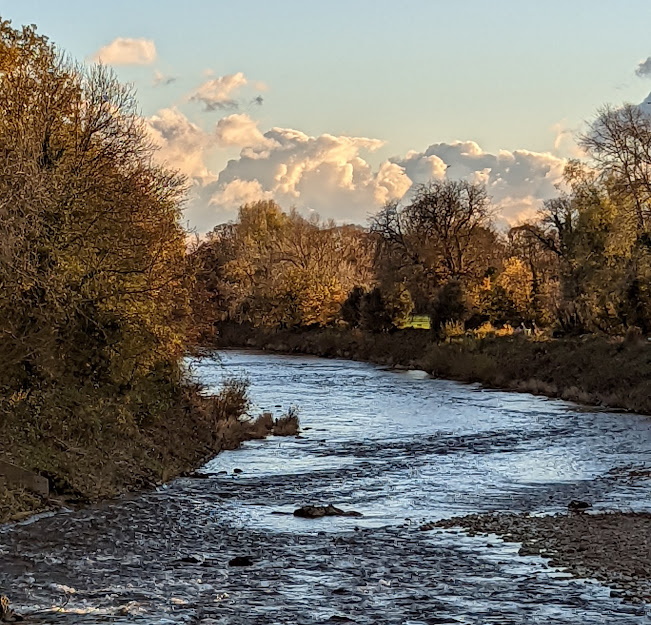 The River Taff (the nearest river to where Bruce is writing.) |
122. The Cliché of Time
| “March Snakeskin will be a
special number full of poems about Time.
Treat the subject any way you care to.” - George Simmers “But to what purpose Disturbing the dust on a bowl of rose-leaves I do not know.” - T.S. Eliot |
|
I, for the life of me, cannot make
sense of Time. I do not understand Time, only
feel it. This is an incomplete observation. An
essential quality is missing in my grasp of
reality. I am forced to confront the limitations
of my intelligence. Not just Time, but other
dimensions, too. For example, I cannot grasp
Consciousness, cannot even find the words to
describe it.
What I do understand is that we are forever
barred from the past. We can bring memories to
mind. We can read what has been written, see
what was filmed, or listen to a sound recording.
We can analyze and interpret fossils. We can
diagnose the most distant past from radiation
that reaches our telescopes. We can remember it,
we can commemorate it, but we cannot live it.
I also understand that we cannot live the future
before it arrives. All too often we squander the
precious present by waiting for the future in
anticipation or anxiety. I’ve made it my
philosophy to try and not waste the moment
because the moment is lost in an instant,
becoming unrecoverable. I fail all the time.
If I were to put this essay into the context of
its Time, in the history in which I find myself
living, President Putin has launched his
invasion of the Ukraine. This preoccupies my
thoughts today. I am disgusted with Putin.
Despite what all the educated world knows about
history and war, I cannot forgive Putin from
bringing this kind of war into the 21st century,
especially when the world needs to bond to save
the planet. Putin divides and distracts. This is
the Time in which I live and write, anticipating
and anxious.
Good or bad, “This, too, shall pass away.” Such
is Time.
Although I am unable to describe or explain
Time, I will resort to the metaphor, the cliché,
of describing it as a river. We have been using
this metaphor at least since Heraclitus in Ionia
and Confucius in China.
When I was still a teen and reading Hermann
Hesse, I felt an appeal to emulate Siddhartha,
who in Hesse’s book, retires to the riverside to
learn from the river. When you are young, you
think a comprehension of reality is not too far
away. I wanted to believe Hesse. I wanted to
copy his Siddhartha and sit by a river until I
arrived at an understanding of reality. What can
the river teach? It is just a metaphor reducing
what we could possibly know into a simpler thing
that is not Time itself. A river does not
explain the qualities of reality that are beyond
the mind’s reach. It does not make the missing
pieces apparent.
It is too long ago for me to remember the book,
but I believe Siddhartha found contentment by
the river. Of course rivers do not always behave
and sometimes flood their banks to wash away any
masters of meditation sitting cross-legged at
the riverside.
All that is left to me is to embrace the mystery
and reshape my attitude so as to enjoy it.
Instead of Siddhartha, I choose to identify more
with Claude Monet, experiencing the River Seine
from his Studio Boat (Le Bateau-atelier). Monet
is often my favorite artist. His floating studio
serves near perfectly as a metaphor for my life
now. I visualize myself in a floating studio on
Time’s river, but penning prose instead of
painting what is experienced.
![]()
Mr Bentzman will continue to report here regularly
about the events and concerns of his life. If you've
any comments or suggestions, he would be pleased to hear from
you.
You can find his
several books at www.Bentzman.com.
Enshrined
Inside Me, his second collection of
essays, is now available to purchase.
